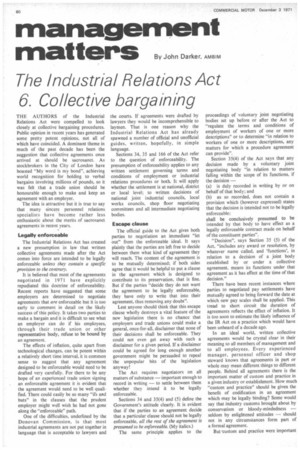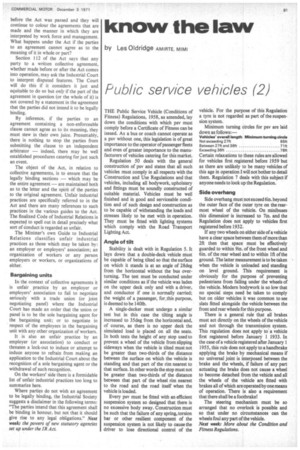management
Page 82

Page 83

If you've noticed an error in this article please click here to report it so we can fix it.
matters By John Darker, AMBIM
The In Relations Act 6. Collective bargaining
THE AUTHORS of the Industrial Relations Act were compelled to look closely at collective bargaining procedures. Public opinion in recent years has generated some pretty potent opinions, not all of which have coincided. A dominant theme in much of the past decade has been the suggestion that collective agreements once arrived at should be sacrosanct. As stockbrokers in the City of London have boasted "My word is my bond", achieving world recognition for holding to verbal bargains involving millions of pounds, so it was felt that a trade union should be honourable enough to make and keep an agreement with an employer.
The idea is attractive but it is true to say that many sincere personnel relations specialists have become rather less enthusiastic about the merits of sacrosanct agreements in recent years.
Legally enforceable The Industrial Relations Act has created a new presumption in law that written collective agreements made after the Act comes into force are intended to be legally enforceable unless they contain a specific provision to the contrary.
It is believed that most of the agreements negotiated in 1971 have explicitly repudiated this doctrine of enforceability. Recent reports have suggested that some employers are determined to negotiate agreements that are enforceable but it is too early to comment in detail on the likely success of this policy. It takes two parties to make a bargain and it is difficult to see what an employer can do if his employees, through their trade union or other representative body, refuse to be bound by an agreement.
The effects of inflation, quite apart from technological changes, can be potent within a relatively short time interval, it is common sense to suggest that any agreement designed to be enforceable would need to be drafted very carefully. For there to be any hope of an experienced trade union signing an enforceable agreement it is evident that the agreement would need to be well qualified. There could easily be so many "ifs and buts" in the clauses that the prudent employer might well wish he had not gone along the "enforceable" path.
One of the difficulties, underlined by the Donovan Commission, is that most industrial agreements are not put together in language that is acceptable to lawyers and the courts. If agreements were drafted by lawyers they would be incomprehensible to laymen. That is one reason why the Industrial Relations Act has already spawned a number of official and unofficial guides, written, hopefully, in simple language.
Sections 34, 35 and 166 of the Act refer to the question of enforceability. The presumption of enforceability applies to any written settlement governing terms and conditions of employment or industrial relations procedures or both. It will apply whether the settlement is at national, district or local level; to written decisions of national joint industrial councils, local works councils, shop floor negotiating committees and all intermediate negotiating bodies.
Escape clause The official guide to the Act gives both parties to negotiation an immediate "let out" from the enforceable ideal. It says plainly that the parties are left free to decide between them what kind of agreement they will reach. The content of the agreement is to be mutually determined; if both sides agree that it would be helpful to put a clause in the agreement which is designed to contribute to its preservation, that is fine. But if the parties "decide they do not want the agreement to be legally enforceable, they have only to write that into their agreement, thus removing any doubt".
Lest anyone should think that this escape clause wholly destroys a vital feature of the new legislation there is no chance that employers and trade unions could make a general, once-for-all, disclaimer that none of their decisions shall be enforceable. They could not even get away with such a disclaimer for a given period. If a disclaimer could be agreed for long enough another government might be persuaded to repeal the unpopular bits of the legislation anyway!
The Act requires negotiators on all matters of substance — important enough to record in writing — to settle between them whether they intend it to be legally enforceable.
Sections 34 and 35(4) and (5) define the Government's attitude clearly. It is evident that if the parties to an agreement decide that a particular clause should not be legally enforceable, all the rest of the agreement is presumed to be enforceable. (My italics.) The same principle applies to the proceedings of voluntary joint negotiating bodies set up before or after the Act to "regulate the terms and conditions of employment of workers of one or more descriptions" or to determine "in relation to workers of one or more descriptions, any matters for which a procedure agreement can provide".
Section 35(4) of the Act says that any decision made by a voluntary joint negotiating body "in relation to matters falling within the scope of its functions, if the decision — (a) is duly recorded in writing by or on behalf of that body; and (b) as so recorded. does not contain a provision which (however expressed) states that the decision is intended not to be legally enforceable;
shall be conclusively presumed to be intended by that body to have effect as a legally enforceable contract made on behalf of the constituent parties-.
"Decision", says Section 35 (5) of the Act, "includes any award or resolution, by whatever name called, and 'functions', in relation to a decision of a joint body established by or under a collective agreement, means its functions under that agreement as it has effect at the time of that decision."
There have been recent instances where parties to negotiated pay settlements have mutually agreed to bring forward the date at which new pay scales shall be applied. This trend to short circuit the duration of agreements reflects the effect of inflation. It is too soon to estimate the likely influence of the IR Act on a practice which would have been unheard of a decade ago.
In an ideal world, written collective agreements would be crystal clear in their meaning to all members of management and to all employees. Every experienced manager, personnel officer and shop steward knows that agreements in part or whole may mean different things to different people. Behind all agreements there is the important matter of custom and practice in a given industry or establishment. How much "custom and practice" should be given the benefit of codification in an agreement which may be legally binding? Some would say that industry customs brought about by conservatism or bloody-mindedness — seldom by enlightened attitudes — should not in any circumstances form part of a formal agreement.
But -custom and practice were important before the Act was passed and they will continue to colour the agreements that are made and the manner in which they are interpreted by work force and management. What happens under the Act if the parties to an agreement cannot agree as to the meaning of it in whole or part?
Section 112 of the Act says that any party to a written collective agreement. whether made before or after the Act comes into operation, may ask the Industrial Court to interpret disputed features. The Court will do this if it considers it just and equitable to do so but only if the part of the agreement in question (or the whole of it) is not covered by a statement in the agreement that the parties did not intend it to be legally binding.
By inference, if the parties to an agreement containing a non-enforceable clause cannot agree as to its meaning, they must stew in their own juice. Presumably, there is nothing to stop the parties from submitting the clause to an independent arbitrator — indeed, there may be well established procedures catering for just such an event.
The object of the Act, in relation to collective agreements, is to ensure that the legally binding sections — which may be the entire agreement — are maintained both as to the letter and the spirit of the parties to the original agreement. Unfair industrial practices are specifically referred to in the Act and there are many references to such practices in the various guides to the Act. The finalized Code of Industrial Relations is expected to spell out in detail precisely what sort of conduct is regarded as unfair.
The Minister's own Guide to Industrial Relations classifies unfair industrial practices as those which may be taken by: an employer or employers' association; an organization of workers or any person employers or workers, or organizations of either.
Bargaining units In the context of collective agreements it is unfair practice by an employer or employers' association to fail to negotiate seriously with a trade union (or joint negotiating panel) where the Industrial Court has made an order that the union or panel is to be the sole bargaining agent for the bargaining unit: or to negotiate in respect of the employees in the bargaining unit with any other organization of workers.
It is also an unfair practice by an employer (or association) to conduct or threaten a lock-out to induce or attempt to induce anyone to refrain from making an application to the Industrial Court about the recognition of a sole bargaining agent or the withdrawal of such recognition.
On the workers' side there is a formidable list of unfair industrial practices too long to summarize here.
Where parties do not wish art agreement to be legally binding, the Industrial Society suggests a disclaimer in the following terms: "The parties intend that this agreement shall be binding in honour, but not that it should give rise to any legal obligations." Next week: the powers of new statutory agencies set up under the IR Act.


































































































































